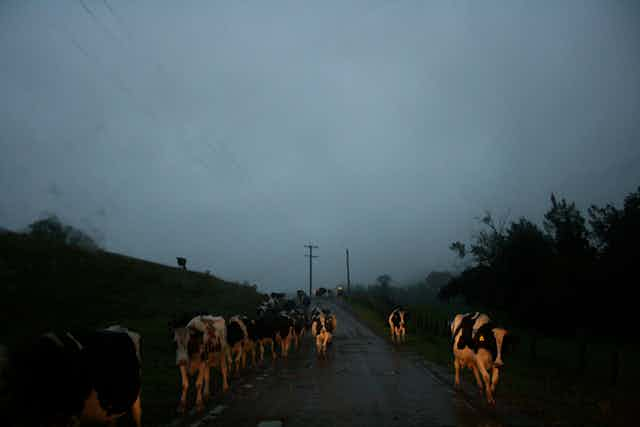The Carbon Farming Initiative is about to provide incentives for dairy farmers to reduce emissions from their milking cows. Emissions will be reduced by changing the cows’ diet.
The proposed new methodology alters the activity of the gut’s methane-producing microorganisms. This reduces the amount of methane “belched” by cattle from their digestive system.
The organisms in the fore-stomach of sheep and cattle produce methane – called enteric methane – from the hydrogen and carbon dioxide that result from microbial digestion of cows’ food.
Strategies for reducing enteric methane include breeding for lower methane-producing animals, microbial interventions, and nutrition and animal management. Most of these are currently being researched through the National Livestock Methane Program. Over the next few years we may see a number of these strategies developed into new Carbon Farming Initiative methods to reduce enteric methane.
But in this case the research team explored dietary interventions, demonstrating that feeds containing tannins or high levels of oil reduce methane production from livestock.
There are five possible ways oil supplementation reduces methane:
- reducing fibre digestion
- lowering total feed intake (this is obviously undesirable, and only occurs when total dietary fat exceeds 6% to 7% of total intake)
- suppressing the micro-organisms that make methane and suppressing rumen protozoa, on which those organisms depend.
Tannins, on the other hand, reduce enteric methane by directly suppressing methane-making micro-organisms.
A key part of the research was demonstrating that different dietary oils – all by-products from other agricultural processes – could reduce enteric methane equally.
The by-products studied included whole cotton seed, cold-pressed canola meal, hominy meal and brewers grains. All of these can theoretically be sourced as by-products of biofuel production. Additionally, if these by-products are adding energy to the diet, they will also increase milk production. The profitability of this milk production increase depends on the comparative price of conventional grain feeding.
The research team then asked the obvious question – if tannin and oils were added to the diet, would this have an additive effect on inhibiting methane production? However, when added to the diet as pure extracts, tannins and oils appeared to neutralise each other (perhaps with the tannin binding the oils making the combination ineffective). The focus shifted to potential feed additives that contain both tannin and oil, naturally occurring in one product. The obvious choice was grape marc, a by-product of wine making with a high concentration of both fat and tannins. Feeding grape marc to dairy cattle reduced methane by up to 20%.
Carbon Farming Initiative offset methodologies can only be built on peer reviewed research, so the team combined their published data with a global review of literature and demonstrated that for every 1% extra oil added to the diet of livestock, enteric methane can be reduced by 3.5%. The upper limit for dietary fats and oils in feed is 7% and the natural oils in grass range from 1% (summer) to 5% (spring), so there is a window of 90 days in the summer when natural grass oils are low enough that supplementary feeding can be introduced to reduce enteric methane production.
This evidence was considered sufficiently robust to underpin the first CFI offset methodology for livestock.
This method has now been released for public consultation. When it’s approved - together with those already approved for destruction of methane from dairy manure ponds and removal of carbon dioxide through environmental plantings - it will give dairy farmers options to take part in the Carbon Farming Initiative. As the income from the CFI for each of these methods individually is relatively modest, these methods are most likely to be adopted where they bring productivity gains or align with broader farming objectives.
This work is the culmination of over six years research by the Victorian Department of Primary Industries (DPI) and the University of Melbourne. The research, co-funded by the DAFF Climate Change Research Program, Meat and Livestock Australia and Dairy Australia, focused on providing dairy farmers with an option for reducing greenhouse gas emissions from milking cows through feeding dietary additives.

